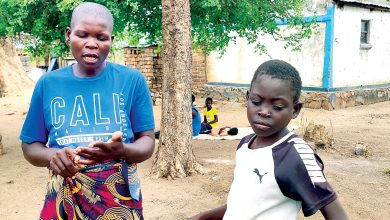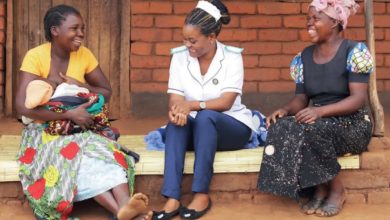Girls in school go pink
The afternoon sun was already scorching, draping Blantyre Secondary School campus in a soft golden glow.
But that day, the usual chatter of students rushing to class was replaced by something different—a bloom of pink ribbons and joy tinged with reflection, anticipation and hope.

It was the annual breast cancer awareness drive by Ashraful Aid Malawi, a Muslim charity that empowers students through health education and community service.
This year, the non-profit organisation partnered with local schools to spread the importance of early detection, compassion, and courage in the fight against the common but little-known cancer.
In a classroom set aside for the event, pink balloons lined the stage and banners screamed: “Check. Care. Share.” as they danced to a summer breeze from open windows.
Rows of students—some flipping through their notebooks, others taking notes, and still others sporting matching pink shirts—filled the seats. It was not just another assembly but a movement.
“Good afternoon, my young champions,” facilitator Jazeera Kachidede broke the silence. “Today, we’re not just talking about breast cancer, we’re talking about life, hope and the power of knowing your body.”
When the medical student, from Kamuzu University of Health Sciences (Kuhes), walked onto the stage, the atmosphere in the hall transformed.
The chatter quieted and a hush fell over the students as she adjusted her hijab and a pink ribbon pinned proudly to her chest.
Her smile was gentle but confident, noiselessly swaying the students to listen hard by the sheer sincerity in her tone.
“I’ve seen fear turn into strength,” Kachidede started to share her experience working with patients, her eyes glistened with emotion. “I’ve also seen what awareness can do; it saves lives, one conversation at a time.”
Every word seemed to land deep in her hearers’ hearts. When she paused, the silence was heavy but filled with warmth that inspires young hearts and minds to make a difference.
Kachidede and Muslim medical students from Kuhes demonstrated how to perform self-examinations, shining a light on the importance of regular screenings for early detection and timely treatment of breast cancer. They broke down medical jargon into simple, relatable language.
For the students, it was eye-opening.
“I never thought about it before,” admitted Form Two student Prosperina Phiri, 12. “But now I know breastfeeding is not something that only affect old women. It even affect men. We all need to be aware of it.”
Between sessions, some students examined themselves to figure out whether they had the signs and symptoms. Others played informative games to further understand the cancer, pay respect to those fighting the disease and those who lost the battle.
However, what began as an awareness event morphed into a deeper lesson in empathy, community support and the power of informed youth.
“We want to plant a seed not just of knowledge, but of compassion. If these students carry this awareness to their families and friends, we multiply the impact tenfold,” said Ashraful Aid Malawi project coordinator Wadson Banda.
Throughout, the students shared their experience and asked questions, gradually discovering that they too can be part of something that saves lives.
By the end of the day, the hall echoed with applause, laughter and a soft rustle of pink ribbons.
Research shows breast cancer screening services in Malawi are rapidly increasing, ranking the third most common cancer among women in the country. Figures from healthcare facilities show it causes 4.4 percent of all cancer-related deaths nationwide.
October was cancer awareness month globally and Malawi joined the march to spread information that people can use. The Ministry of Health also rolled out an HPV vaccine among girls aged nine to 18 to reduce the risk of cervical cancer, the country’s most deadly cancer.




